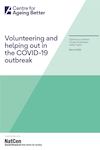Sign up to receive the latest news, research, policy updates and events about ageing.
SubscribeContact our team for more information
Contact usThe COVID-19 outbreak, and the restrictions introduced to contain and slow the spread of the virus across the country, forced individuals and society to abruptly change how they lived and worked, almost overnight. These restrictions meant many people could no longer access long-standing social networks as easily as before the pandemic, with face-to-face interactions severely limited.
These two reports below, based on research conducted by NatCen Social Research, examine volunteering and community connectedness in the COVID-19 outbreak.
The first report, 'Volunteering and helping out in the COVID-19 outbreak', aims to understand the patterns of formal volunteering and informal support that emerged in, and between, July 2020 and November 2020.
The second report, 'Community connectedness in the COVID-19 outbreak', investigates how people across England related to their neighbourhoods as the COVID-19 pandemic challenged individuals and communities while reducing their access to traditional mechanisms of support.
The data used in this report was collected in two survey waves of the NatCen Opinion Panel, using a probability-based sample recruited from people who had previously responded to the British Social Attitudes survey.


Sign up to receive the latest news, research, policy updates and events about ageing.
SubscribeContact our team for more information
Contact us